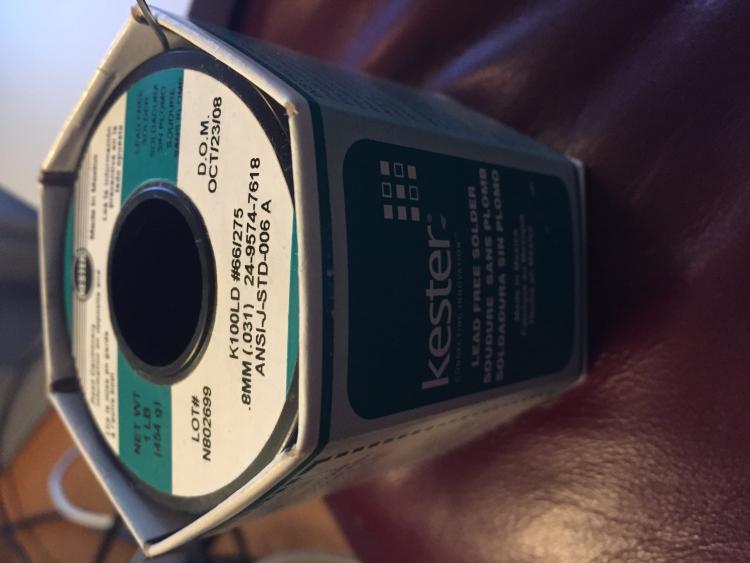Lead-Free Solder!
|
Okay, I'm pretty damn excited about this. I just got some Kester Lead-Free solder, and its really nice! Same melting point as leaded-solder too!
I live in a small Brooklyn apt with my wife, my 2 year old son (and a daughter to be born in June!). So i've always been pretty freaked out about having lead in the home. I was always obsessively cleaning off my work table, tools, etc to make sure there was no lead stuff anywhere after a soldering session. Decided to finally try out the lead free and could not be happier. Can't believe I waited this long. On the various forums, lead-free seems to have a bad reputation. Claiming you need really high heat, the solder does not flow well, etc. But the stuff I just got works beautifully. Maybe years ago the stuff was bad for home use? Lead sucks. I always just assumed it was a necessary evil to do the hobby. I urge anyone who is weary of working with and having lead around to try this stuff out. They have lots of different kinds. Some with much higher melting points, etc. Here is a pic of the stuff I got. Kester K100LD #66/275 (.031). Certainly more expensive ($35 for a 1lb spool), but completely worth it to me. I'm officially getting rid of all lead stuff I have thats not already in an enclosure. So I'm gonna get rid of my huge "box of fail" and other random stuff and start from scratch, lead-free. 
|
|
Not sure why the pic loaded sideways.

|
|
I'm also using lead-free for much the same reasons - it's okay, but does not flow as nicely as lead solder and needs higher temp, but okay. But I never researched if a different type/brand might be better - maybe I can get that stuff here in Europe and give it a try!
|
|
In reply to this post by Kinski
Here is a post I put up on the Fender Discussion Page NINE YEARS AGO! Shit, time does fly!
The general concensus in internetland is that lead free is garbage. Most of it is, especially cheap Maplin/Radio Shack grade solder. However there are good ones available you just have to dig around for info, and try a few different types to see if they are any good. "After several recent threads on the use of lead free solder, and the problems that many people have with using it, I have sought some advice on the subject from the electronics lecturers at the college where I work. Basically there are only two types of leaded solder, 60/40 (60% tin / 40%lead) and 63/37 (63% and 37%lead). Everyone one has used it for years, and it works great on guitars. Lead solder is now against European RoHS (Restriction of Hazardous Substances) regulations. It's use is therefore banned on all electrical equipment, including amps and guitars. As far as I am aware, The US may also follow suit in the future. A guitar manufacturer,guitar tech or casual hobbyist cannot use lead solder on any guitar for a customer, whether he charges a fee for the job, or does it for free. HOWEVER it is still legal to repair your own guitar with lead solder. A quick look on Wikipedia (search for "solder") shows that there are a staggering sixteen different types of lead free solder. The problem is that some types are ideal for industrial processes, like wave soldering, re-flow, laser soldering etc., but are not suited to hand soldering. Ad to this the fact that most of these solders come with several different types of flux - further fine tuning their ideal use, and sixteen types of solder turns into HUNDREDS of types, and with hugely varying prices. The types of lead free sold in electronics stores like Radio Shack or Maplins here in the UK, contain around 96% tin/ 3.5% silver and 0.5% copper, and really don't like sticking to pots, trem claws etc. They are really intended for PCB work. Other FDP posters like Smark have reported good results with 97/3 lead free solder. Typically Lead free solder needs much hotter iron temperatures than leaded solder, to work properly. We have ploughed through a huge database of lead free solder types, and with different flux types from different manufacturers, and have looked at the associated manufacturers data sheets, to try and come up with the BEST lead free solder for use on guitars. Maybe the FDP can pool their experience and resources, as try as I might, I can't find an easy answer anywhere. I have however found a type of solder that might be ideal. You won't find it on the high street, but most industrial electronics stockists should carry it. 99.3% tin / 0.7% copper, with a 309 type rosin core, made by Multicore. Melt temperature is 227 degrees, and ideal tip temperature is 350 degrees. The data sheet says that it is ideal for use on difficult surfaces like nickel, chrome and stainless steel, so that covers many guitar components. I've got some on order so will let you know how I get on with it. If anyone else wants to chip in with any recommendations, or types to avoid, we might come up with an answer as to what is best for us. Cheers guys, Mark." And here's a link to the whole thread if anyone wants to read further: http://www.fenderforum.com/forum.html?db=&topic_number=687558&lastpost=2014-07-1420:05:41 |
|
Hello,
I want to try the unleaded, is this one of which you speak Beaker? http://www.ebay.fr/itm/MULTICORE-SOLDER-3099075-M-2METRE-SOLDER-WIRE-LEAD-FREE-0-7MM-/390741055804?hash=item5af9fb593c:g:keIAAMXQatBSa8DW In 0.7mm or 1.2mm? @+ |
«
Return to Open Chat
|
1 view|%1 views
| Free forum by Nabble | Edit this page |

